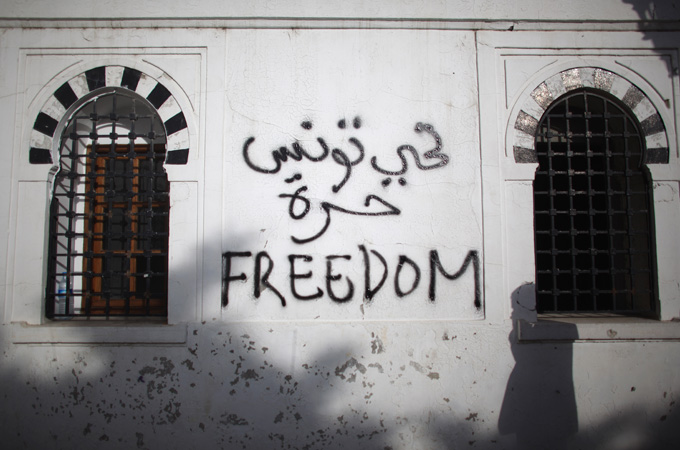Background: Tunisian elections
On October 23, Tunisians will vote in their first democratic election in decades – choosing between 81 new parties.

 |
| Tunisia’s ruling party used to garner 90 per cent of the vote; 81 parties are contesting this election [GALLO/GETTY] |
Tunisians will go to the polls October 23 for what many hope to be the country’s first free and fair election, in the same year that a month-long popular uprising forced former President Ben Ali to flee the country.
Tunisians will be electing a national Constituent Assembly, which will be charged with writing the rules of the new political era. That assembly will spend up to a year writing a new constitution and deciding on the country’s type of government.
Revolution in progress
Whether the Tunisian uprising will result in a genuine revolution – ushering in an era of sustained democracy – depends on the success of the vote and the effectiveness of the political change that many expect to follow.
Since January, a series of rolling protests, many in the Kasbah of Tunis, have called for a thorough purge of former regime officials, warning that allowing remnants of the political elite to linger could lead to a counter-revolution. But others have criticised the protesters for undermining the country’s stability.
The protesters have played a major part in the transitional process. It was their demonstrations against Mohamed Ghannouchi, who held on to his role of prime minister even after most other members of Ben Ali’s government were long gone, that finally forced him out in late February.
Ghannouchi briefly took over as acting president before he handed power over to parliamentary speaker Fouad Mebazaa, when doubts were raised over Ghannouchi’s right to take over the presidency. An interim government was formed and on March 3, 2011, it announced that there would be an election for a Constituent Assembly on July 24. It was later delayed until October 23.
Beji Caid Essebsi, who had been foreign minister under former president Habib Bourguiba, had been made prime minister on February 27, 2011.
Twelve political parties signed a document on September 15, 2011, agreeing to respect the ISIE’s ethical code for the election and throughout the constituent assembly’s mandate.
Under the terms of this agreement, the constituent assembly will be in power for a maximum period of a year.
The interim president and government are to step down immediately after the election, and the constituent assembly is to vote on a new government, which will remain in power until the end of the constituent assembly’s mandate.
At this point, according to the pact, Tunisians will go to the polls to directly elect a new government.
Essebi had initially promised to quit politics for good after the interim government had outlived its purpose. In the weeks ahead of the election, he stirred controversy after telling the New York Times that he would like to stay on after the constituent assembly is elected, perhaps hanging on to his role as the country’s prime minister.
Rewriting the constitution
The Constituent Assembly will be made up of 217 members. Many activists are calling for a parliamentary democracy to avoid an all-powerful president from dominating the political sphere, and for mixed-member proportional representation.
Some of the bigger parties, meanwhile, support a presidential regime.
It will also decide on the role which religion will play in the country’s public life. The 1959 constitution defines Tunisia as a Muslim state, but limits the role of religion in politics and law.
Some Tunisians fear that the election of an Islamist party could lead to the erosion of secular values enshrined by Bourguiba when the country won its independence from France. Others aspire to a new direction, with more emphasis on the country’s Arab-Muslim roots.
Ambitious gender quota
The National Council for the Protection of the Revolution, a body created to help oversee the transition process, made gender parity an obligation for electoral lists in April. This step, aimed at addressing the perceived risk that women could be sidelined in the fledgling democracy, ensures that 50 per cent of candidates fielded by every party must be female.
The lists must alternate between genders (man-woman-man or woman-man-woman), meaning Tunisia’s gender quota is more ambitious than any other country in the Arab world – and globally.
In the time since the interim government announced the upcoming elections for the Constituent Assembly, 111 political parties were formed – 81 of which were actually approved to campaign. For decades, Tunisia had been under autocratic rule and 90 per cent of the vote used to be awarded by the interior ministry to the ruling party – making democracy a new experience for Tunisians.
Senior party members of the disbanded former ruling party, the Constitutional Democratic Rally, will be banned from the upcoming election if they were involved in politics in the last ten years. An EU delegation of 150 observers is deployed to Tunisia to monitor the election process for fairness and transparency.
The front-runners are the moderate Islamist Ennahdha Party, with around 20 per cent of the voters’ support, and the centre-left Progressive Democratic Party, with about 10 per cent support. Many polls show that about half of the country’s 7 million voters remain undecided.